SUMMARY
The programme will be conducted over two weeks from August 26 to September 10, 2018
The programme has received more than 20K applications
A 91-member delegation has gone to Silicon Valley, more than 40% of whom are women
The Rajasthan government, in a first, has gone global with the initiative by the Department of Information Technology & Communications (DoIT&C) for a Student Startup Exposure Program to encourage entrepreneurship among the youth of the state. Under this programme, the Rajasthan government has sent a delegation of 91 people, which includes students from the state, on an all-expense-paid residential learning trip to Silicon Valley.
The Startup India Initiative by Prime Minister Narendra Modi, which was launched in January 2015, has caught on like wildfire among all the states in the country. Various state governments have jumped on the startup bandwagon to create an advanced and cohesive startup ecosystem in their respective states. In this race, Rajasthan has established itself as a frontrunner, emerging as an example for others to follow. The government is infusing digital technology into every aspect and is giving a complete facelift to the state.
Encouraging entrepreneurship has been a key goal of the Rajasthan government, for which it has taken initiatives such as the iStart platform, the recently launched Bhamashah Techno Hub (India’s largest business incubator in Jaipur), and many more, thereby competing with favoured startup locations like Telangana, Bangalore, and Pune.
Announced in May 2018, the Students Startup Exposure Program received more than 20K applications of which 4,500+ applications were from female students in the state. The department had mandated that 25% of the total strength travelling to Silicon Valley for the programme should be women. The emphasis not surprising as women’s empowerment is high on the agenda of the present government led by chief minister Vasundhara Raje. This effort translated into 40% of the students in the programme being women.
Things To Watch Out For In The Programme
Over the course of two weeks, the students who’ve travelled to Silicon Valley will get an opportunity to learn various aspects of building a tech product startup from renowned experts in the global startup ecosystem. The participants will receive mentorship to build their prototype and pitch it to prospective investors in Silicon Valley and gain feedback from them. The participants will also get a chance to acquire on-the-job training at some eminent organisations and interact with successful founders and other professionals.
Along with the two-week residential programme, selected students will also be provided three-month access to an online learning course to further improve their knowledge and make them ready for the startup world. The course will be the same for the resident Silicon Valley programme.
Rajasthan’s Department of IT & Communications has become the first government body to launch an initiative such as this to promote student entrepreneurs and give them a global platform to learn.
A senior official from the department said, “The Rajasthan Student Startup Exposure Program was conceptualised to fulfill the vision of Chief Minister Vasundhara Raje who wanted to provide the youth of the state with a platform to explore their entrepreneurial skills and learn from the best startup professionals of the world.”
The exposure programme will provide world-class facilities and exposure to young entrepreneurs of Rajasthan. Its main aim is to help the young minds of the state to transform their innovative ideas into successful businesses thus adding value to the country in terms of product and job creation.
This DoIT&C initiative will certainly open the doors for students to make their entrepreneurship dreams come true. Not only this, it will also turn out to be a huge milestone in the startup journey of Rajasthan and bring college students and the budding entrepreneurs into the ecosystem. The initiative is not just another page in the Indian startup story but an acknowledgement of the startup spirit in India and reflects the Rajasthan government’s commitment to improve India’s position on the world map.
Follow this Live Blog for a further update on the programme!
Future Of Technology & The Entrepreneurial Opportunities It Has To Offer: Studentpreneurs Get Insights
Day 6 for the students on the istart knowledge tour in silicon valley started with attending a session by Vivek Wadhwa, a technology entrepreneur, a researcher, and an academician and a former entrepreneur on the topic “Future of Technology & entrepreneurship opportunities it has to offer”
The students curiously huddled in to listen to the esteemed Wadhwa, where he spoke about the optimism of Silicon Valley and the culture of openness and information sharing.

He spoke about exponential advances that technology is making enabling them to build solutions which a few years back people could only dream of. According to Wadhwa, entrepreneurs can do today what only governments and big companies could do before.
Technology according to him was poised for a revolutionary growth in the future, where being connected online all the time, even physically, would be a common feature. Wadhwa expressed how Artificial Intelligence has advanced such that it can analyse large amounts of data and help improve decision-making in every sector from agriculture to healthcare to finance and even transportation.
Wadhwa emphasised, ‘’The humanoids of science fiction are also becoming a reality. The actuators and sensors necessary to build robots that resemble Rosie from the TV series The Jetsons or C-3PO from Star Wars are commonly available and inexpensive. There is no reason that Rosie, or Ritu the Robot, can’t originate from Jaipur—and speak Hindi or Marwari.’’
Further, he spoke about Artificial Intelligence being the defining future and urged students to explore the possibility of learning AI, doubling their market-value and opening avenues as AI was the reality and a necessity in the time to come.
He concluded, ‘’It is so important to teach India’s entrepreneurs about the advances to inspire, motivate, and support their efforts. They will surely put technologies to their best uses and do this out of concern for humanity rather than just an intention to make profits.’’
Encouraged by the talk, the students then made their way for a tour to NASA’s Ames Research Centre. The centre is located in the heart of Silicon Valley. And, since the early 90, the centre has helped NASA in conducting world-class research and development in aeronautics, exploration technology and science.
All in all, it was a knowledge-filled day for the students, who had much food for thought on which to hinge their entrepreneurial dreams.
A Visit To Intel Museum, A Session On 101 Of Funding, And Pitch Presentations By Six Startups
On Day 5, the students on the iStart knowledge tour in Silicon Valley visited the high-tech Intel Museum where they got a chance to explore the complex world of silicon technology.
After this, the students made their way to the Silicon Valley Bank (SVB), where the top six shortlisted teams made their pitches. They also attended a session by John Lee, vice presidnet, Early Stage Practice, SVB, who spoke about venture equity and funding at length.
Lee explained in great detail the various stages of investments and capital raising for a startup — right from the initial stage when founders usually rely on family, friends, angel investors, and incubators right up to the IPO stage. The session also gave them an overview of venture debt Vs traditional debt. All in all, it was an informative session covering the founding stones on which entrepreneurship is built.
Day 5 also saw the much-awaited pitch presentations by six selected startups in front of John Lee and Priya Rangarajan, director of Early Stage Practice at SVB.
Here’s a look at the startups which made their pitches:
- Pitch 1: The first pitch was made by QBOX, a challenge-based competitive learning programme for English writing. The platform runs challenges based on thematic apperception tests. The articles submitted are evaluated by expert writers from various domains and the winning entries are published on the platform. The platform was launched just three months ago for students of BITS, Pilani, and has 1500+ active users at present.
- Pitch 2: The second pitch was by NVIROX, a real-time lake monitoring system. The system tests pollution and water quality levels. The team, which hails from Udaipur, Rajasthan, has successfully implemented its three-month pilot at Fateh Sagar Lake in the same city. The data captured by the system was also made available to the larger public through an android application. They are now looking to extend the solution to all 13 lakes in Udaipur and also to invest in product enhancements to adapt the solution to other drinking water bodies such as wells, tanks etc.
- Pitch 3: The next startup to pitch was erfinderlabs, which plans to indigenously develop and supply high-precision research equipment for physics labs in the country. In the present scenario, every year over $125 Mn worth lab equipment is imported to India and a bulk of the purchases is made with taxpayer money through grants from the Department of Science and Technology (DST). Erfinder aims to address this problem. The startup also wishes to open source its designs to encourage hobbyist behaviour within the scientific community, thereby bringing about a cultural change in the way science research is done in India.
- Pitch 4: The fourth pitch was made by EscapeSuicide, a chat-based, AI-powered solution which serves as a mental health first aid kit. The chat-based solution is available on Telegram and Facebook Messenger. The startup is collaborating with one of the largest NGOs from India working in the space of suicide prevention for a pilot rollout.
- Pitch 5: The world over, people are coming up with technology solutions for the differently abled. SmartStick, the startup which pitched next, is building an intelligent Internet of Things (IoT)-enabled stick for the differently abled. This team from Ajmer is looking to impact the lives of over 9 Mn Indians suffering from blindness by developing a smart stick. The solution, in addition to aiding detection of objects and people, is also voice enabled.
- Pitch 6: Last, but not the least was VisionAI, a healthtech startup that is looking to address the problem of diabetic retinopathy. The solution looks to leverage machine learning technologies to aid testing and diagnosis. The team has successfully completed its POC and is now looking pilot with a few ophthalmologists. The offering will be made available as a SAS service for ophthalmologists.
While the students were brimming with excitement, the judges and the audience were impressed by the wide variety of initiatives that these young entrepreneurs are undertaking with a simple aim of simplifying, easing, and saving lives.
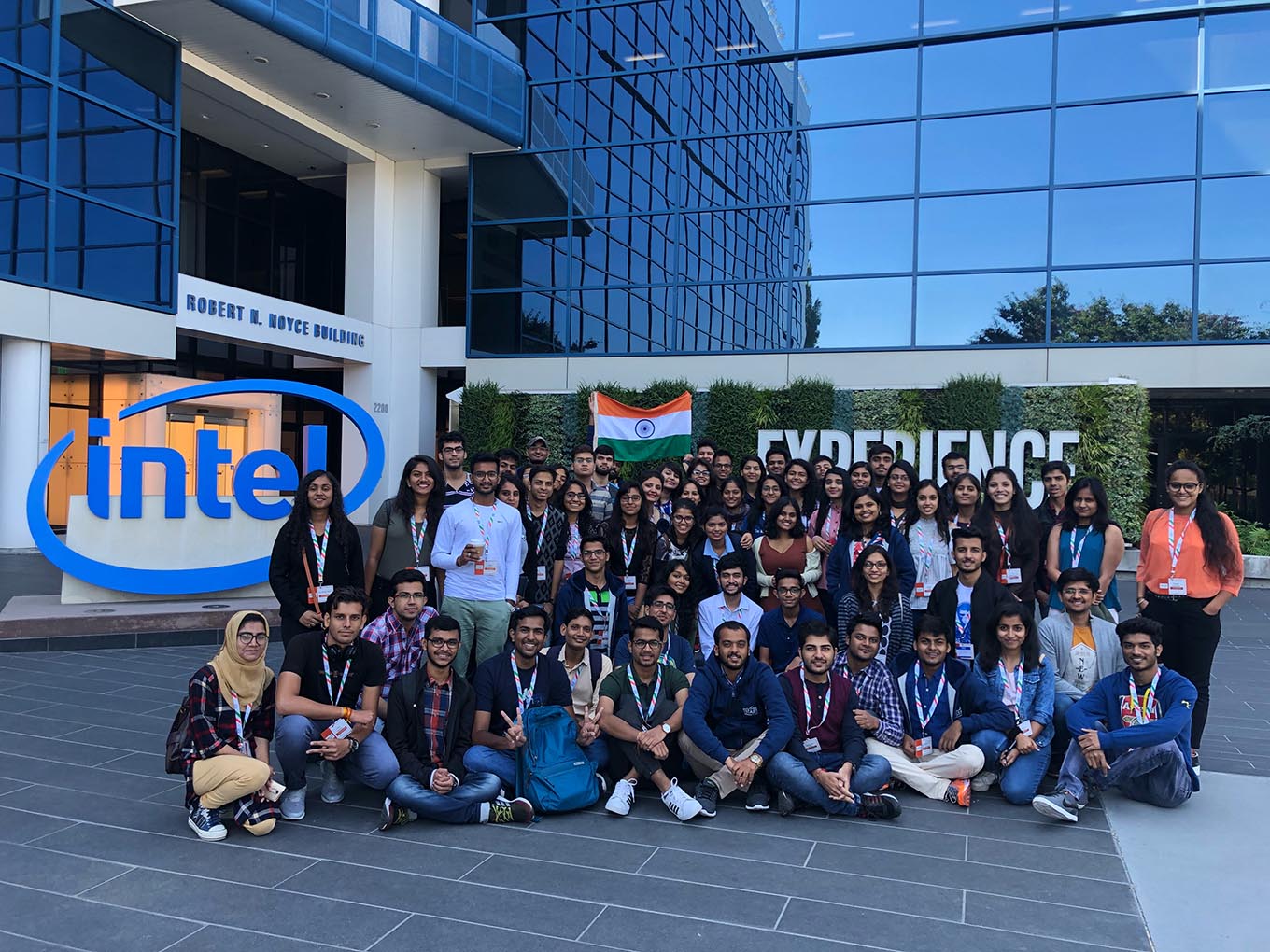
Guidance, Mentoring, And Shortlists: Day 4 Was All About Idea And Prototype Reviews
After three days of visits to monumental sites, knowledge sessions and networking it was the day for reviews. Each of the student teams was required to share the progress made on their idea or prototype after which it was reviewed and the required guidance provided in the areas of improvement.
The first half of day 4 comprised a brief knowledge session which was aimed at educating students on how best to prepare their pitches.

This was followed by office hour discussions with mentors. Post this, in the second half, the teams made their pitch presentations and based on these the mentors shortlisted the top 10 well-performing teams.

Of the ten teams, the top five were further given guidance and mentoring on how best to make their pitches, as they prepared for their presentations at the Silicon Valley Bank tomorrow.
While the rest of the five teams will go on for additional guidance and mentoring, we were amazed to see the hard work put in by students on differential and innovative concepts ranging from ideas and prototypes on different sectors like Virtual Reality (VR), Education tech, and Software as a service (SaaS) and more.
On Day 5, all finalists of the Rajasthan SSEP program will also be given access to the online learning platform.
Day 3 Saw The Student Delegation From Rajasthan On A Visit To The Apple Centre
Day 3 was an exciting and eventful day for the students as they got to visit the Apple Centre at their Cupertino Headquarters and had a chance to experience various Apple products and merchandise available only at the centre, first hand.
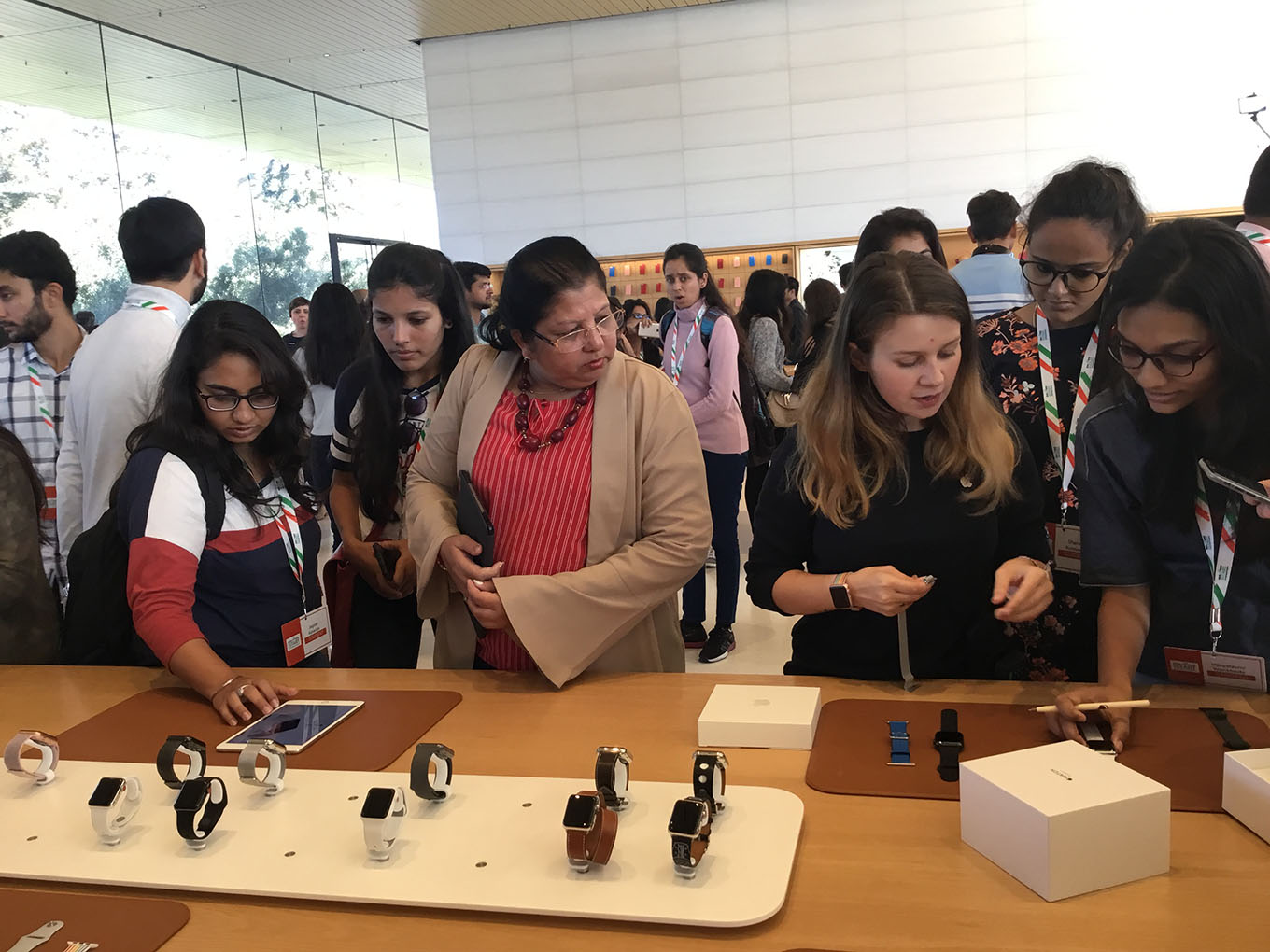
The experience of the highly advanced Apple Infinite Loop Augmented Reality campus view was a key highlight of the day. The visit included a look at the Auditorium/Steve Jobs theatre and research and development Centre.

The delegation then visited the North Eastern University in Silicon Valley and witnessed a thought-provoking session with PK Agarwal, the Dean & CEO of the university and Chetan Parikh, CEO & Co-founder of ezDI.
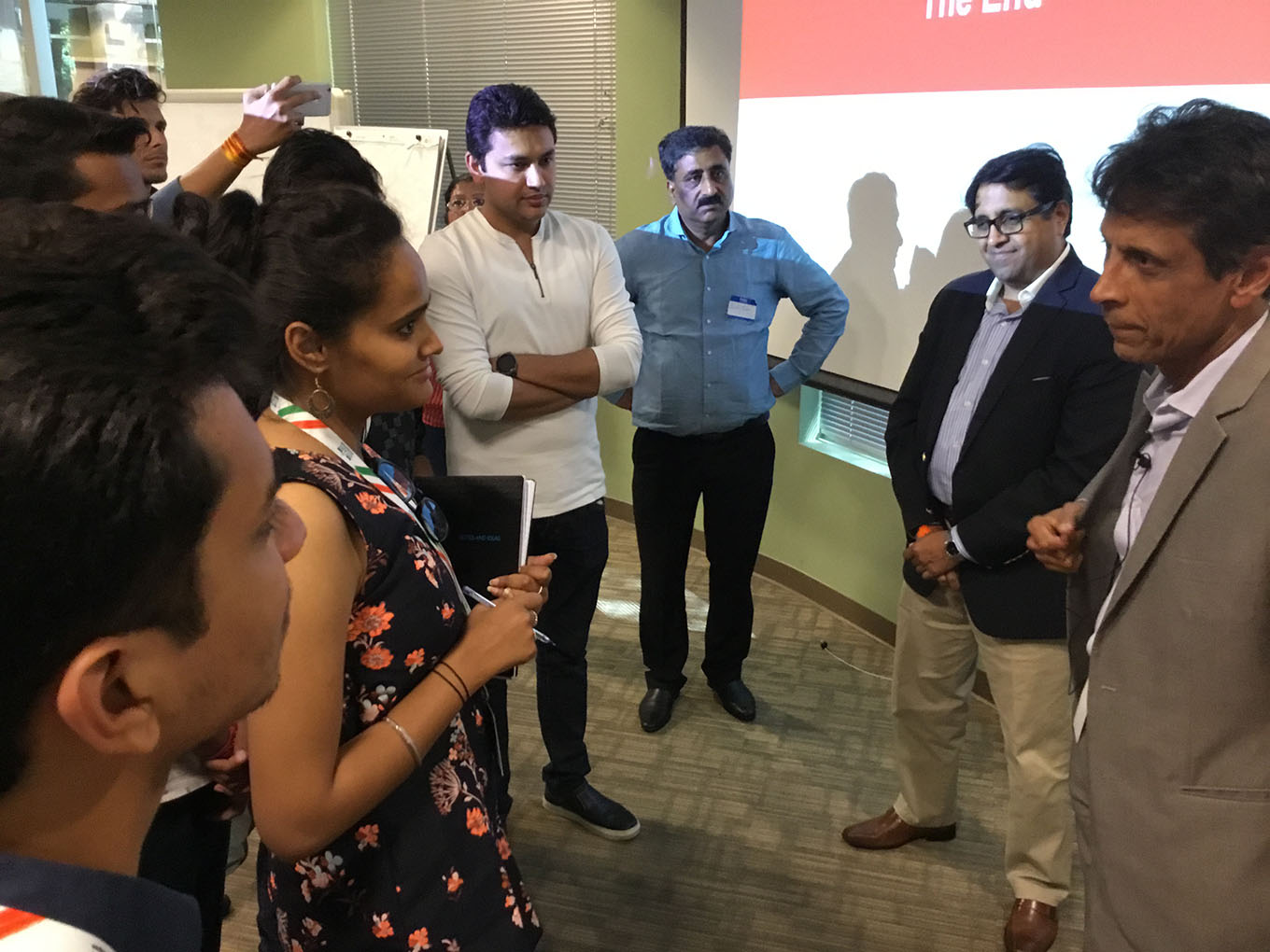
While P.K.Agarwal gave an insight into the theme—A Vision of the future: Disruption and Opportunities—covering various fields in technology namely, Artificial Intelligence (AI), Machine Learning (ML), Robotics, Big Data and Blockchain.
Chetan Parikh’s session was more personal as he shared his entrepreneurial journey with the students, his passion for healthcare and the education sector. And, even offered to help the student teams working in similar sectors.
The students also had an opportunity for discussions with the duo on their product ideas and the challenges faced by them. All in all it was a day well spent with events one may only have dreamt of.
Rajasthan’s Student Entrepreneurs Interact With World’s Leading Coders At Silicon Valley
The learning for the young minds from Rajasthan in silicon valley on day 2 continued with them getting opportunities to meet their global peers and understanding the opportunities available in the field of coding and programming.

The students visited 42 Silicon Valley coding school, a free education based advanced computer programming school providing a collaborative and disruptive platform to groom coders across the world. The school works in a nonconventional way without teachers and mentors. And, the way to learn is by coders helping each other on various computer languages. The school has multiple residential curricula for coders, who get selected after passing a rigorous 28 days training and examination.
Ambassadors – the individual group leaders divided the 91 member team into 8 groups and had detailed discussions, which involved showcasing of projects, a hands-on experience on niche and emerging and new technologies, like Artification Intelligence (AI), Machine Learning (ML), etc. The possibilities for Startups and the growth that they could expect was also explained in detail.

It was no surprise that the students were delighted to meet world class coders and were impressed with not just their coding skills but also their collaborative approach towards working and researching on computing problems.
Further, the students will be undergoing rigorous training and workshop sessions to be ready to pitch their ideas in front of the world’s finest Investors and venture capitalists like the Silicon Valley Bank, and more over the next 10 days.
Student Delegation Tours Startup Mecca University Avenue, Visits Stanford University
The student delegation sent for the Rajasthan government’s Students Startup Exposure Program was quick to settle in after the long journey from India to Silicon Valley. Day 1 started with the enthusiastic students making their way for an orientation session organised. They also got a chance to visit University Avenue in Palo Alto, California — the Mecca of startups — and see the building where the likes of Google and Logitech started out.
The session aimed to provide an overview of Silicon Valley and its culture. The objective was to equip the students with an understanding of how their approach should be to be able to make the most of their Silicon Valley experience.
At the orientation, the students were explained how the learning programme component of the tour is structured and given access to the online modules. Over the course of the next two weeks, student teams will be working on their own individual projects to develop their alpha prototypes.
The online learning programme, designed for self-learning, takes in modules spanning the stages in a startup’s development process — from idea selection to alpha prototype development. The best performing teams will also get a chance to pitch their project ideas to organisations such as Silicon Valley Bank and TechCode.
In the second half of the orientation session, students were given time to go around and explore the renowned University Avenue and the Stanford University campus. ‘165 University Ave’ is a small rented office building on University Avenue, the main commercial street in downtown Palo Alto, California, which held the early offices of Google, PayPal, Logitech, etc. Palo Alto is the places from where several Silicon Valley startups launched their operations from garages and humble offices and went on to make it big.
The students also got a chance to visit the HP Garage, considered the birthplace of Silicon Valley, and Coupa Cafe, the famous coffee shop in University Avenue full of founders going through startup formation and fundraising discussions. Adjacent to Stanford is Sandhill Road as well, where almost all the names in the VC world have their offices.
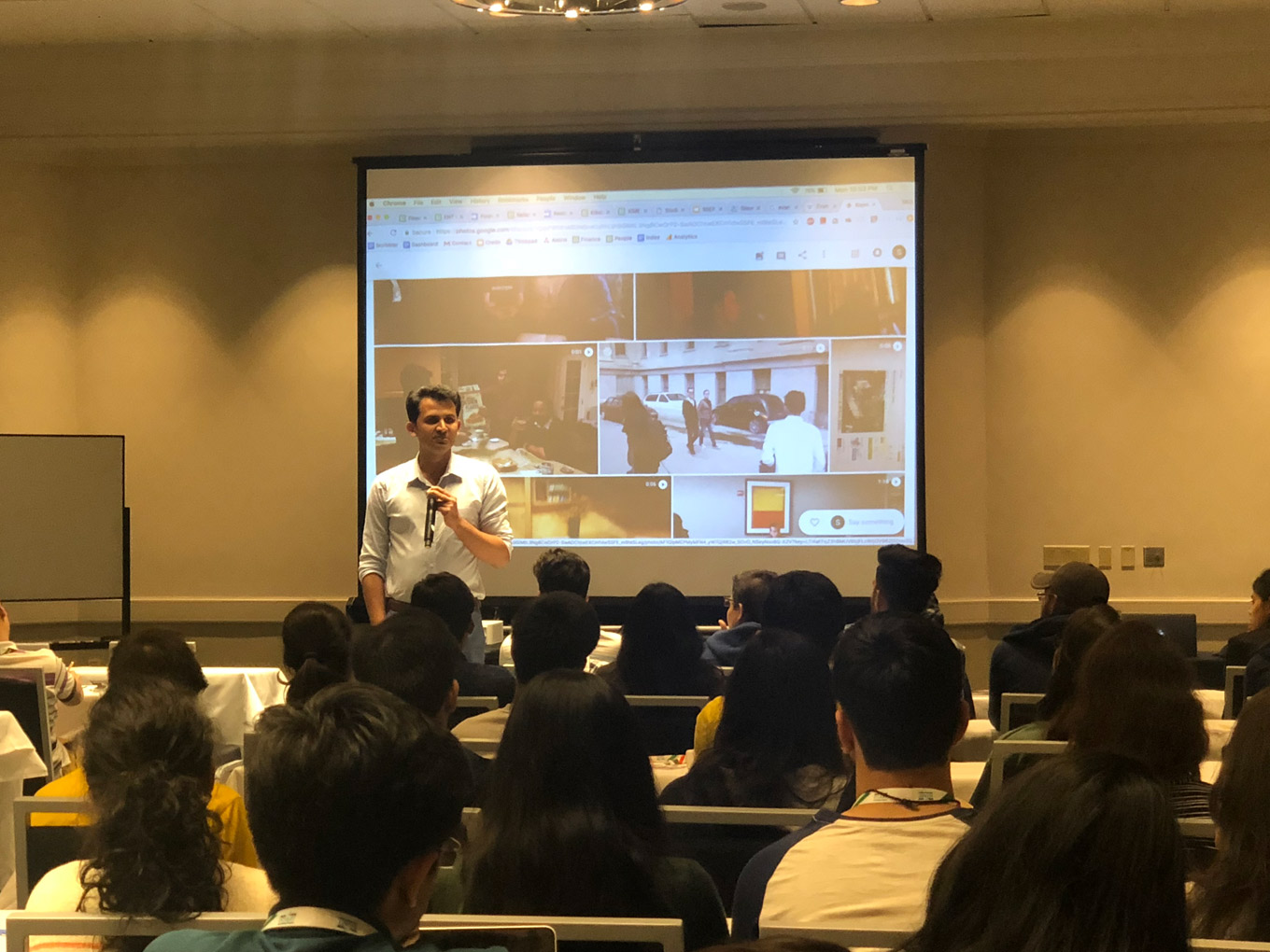
Note: The author of this story is on a sponsored trip to the Silicon Valley by the Rajasthan Government for the coverage of the Student Startup Exposure Program.



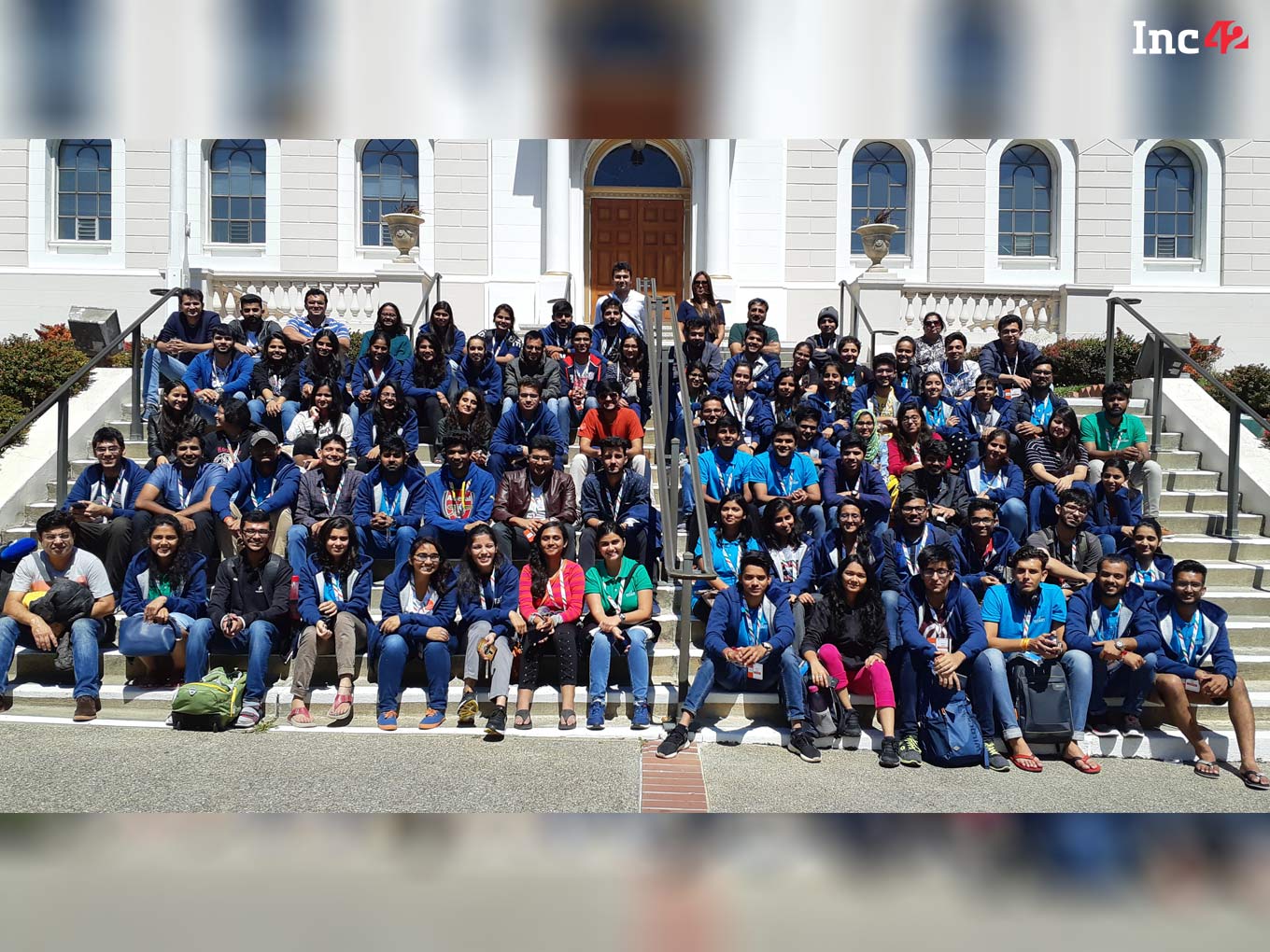




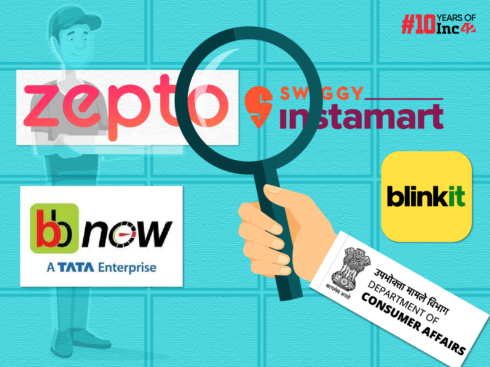
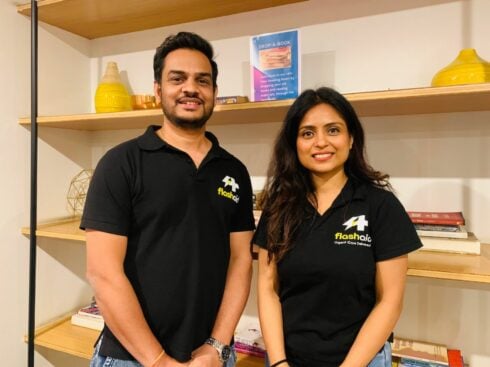

![[Live Blog] Rajasthan: Enabling A New Age Of Next-Gen Student Startups Through Silicon Valley Exposure Programme-Inc42 Media](https://cdn.inc42.com/wp-content/uploads/2023/09/featured.png)
![[Live Blog] Rajasthan: Enabling A New Age Of Next-Gen Student Startups Through Silicon Valley Exposure Programme-Inc42 Media](https://cdn.inc42.com/wp-content/uploads/2023/09/academy.png)
![[Live Blog] Rajasthan: Enabling A New Age Of Next-Gen Student Startups Through Silicon Valley Exposure Programme-Inc42 Media](https://cdn.inc42.com/wp-content/uploads/2023/09/reports.png)
![[Live Blog] Rajasthan: Enabling A New Age Of Next-Gen Student Startups Through Silicon Valley Exposure Programme-Inc42 Media](https://cdn.inc42.com/wp-content/uploads/2023/09/perks5.png)
![[Live Blog] Rajasthan: Enabling A New Age Of Next-Gen Student Startups Through Silicon Valley Exposure Programme-Inc42 Media](https://cdn.inc42.com/wp-content/uploads/2023/09/perks6.png)
![[Live Blog] Rajasthan: Enabling A New Age Of Next-Gen Student Startups Through Silicon Valley Exposure Programme-Inc42 Media](https://cdn.inc42.com/wp-content/uploads/2023/09/perks4.png)
![[Live Blog] Rajasthan: Enabling A New Age Of Next-Gen Student Startups Through Silicon Valley Exposure Programme-Inc42 Media](https://cdn.inc42.com/wp-content/uploads/2023/09/perks3.png)
![[Live Blog] Rajasthan: Enabling A New Age Of Next-Gen Student Startups Through Silicon Valley Exposure Programme-Inc42 Media](https://cdn.inc42.com/wp-content/uploads/2023/09/perks2.png)
![[Live Blog] Rajasthan: Enabling A New Age Of Next-Gen Student Startups Through Silicon Valley Exposure Programme-Inc42 Media](https://cdn.inc42.com/wp-content/uploads/2023/09/perks1.png)
![[Live Blog] Rajasthan: Enabling A New Age Of Next-Gen Student Startups Through Silicon Valley Exposure Programme-Inc42 Media](https://cdn.inc42.com/wp-content/uploads/2023/09/readers-svg.svg)

![[Live Blog] Rajasthan: Enabling A New Age Of Next-Gen Student Startups Through Silicon Valley Exposure Programme-Inc42 Media](https://cdn.inc42.com/wp-content/uploads/2023/09/twitter5.png)
![[Live Blog] Rajasthan: Enabling A New Age Of Next-Gen Student Startups Through Silicon Valley Exposure Programme-Inc42 Media](https://cdn.inc42.com/wp-content/uploads/2023/09/twitter4.png)
![[Live Blog] Rajasthan: Enabling A New Age Of Next-Gen Student Startups Through Silicon Valley Exposure Programme-Inc42 Media](https://cdn.inc42.com/wp-content/uploads/2023/09/twitter3.png)
![[Live Blog] Rajasthan: Enabling A New Age Of Next-Gen Student Startups Through Silicon Valley Exposure Programme-Inc42 Media](https://cdn.inc42.com/wp-content/uploads/2023/09/twitter2.png)
![[Live Blog] Rajasthan: Enabling A New Age Of Next-Gen Student Startups Through Silicon Valley Exposure Programme-Inc42 Media](https://cdn.inc42.com/wp-content/uploads/2023/09/twitter1.png)
